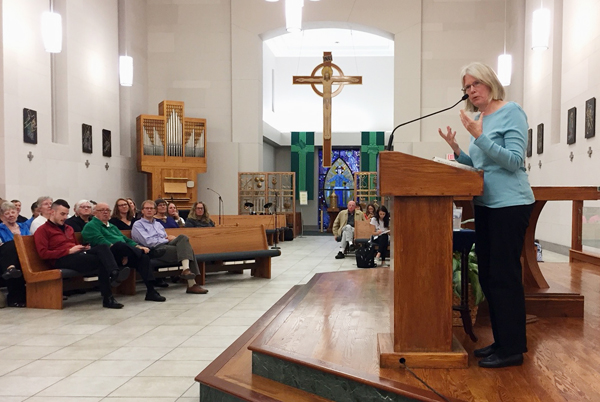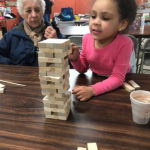
Kate Hennessy, granddaughter of Dorothy Day, speaks at St. Ambrose University in Davenport on Sept. 27.
By Elizabeth Starr and
Barb Arland-Fye
The Catholic Messenger
Kate Hennessy said she and her mother Tamar, the daughter of Dorothy Day, co-founder of the Catholic Worker, “spent decades trying to figure out who Dorothy Day was.” Plenty has been written about the late social justice advocate, including her own thoughts in the Catholic Worker newspaper and in other publications. But none of it touched on the Dorothy Day that her family knew and loved.
“Dorothy Day: The World Will Be Saved By Beauty” provides that much needed view, believes Kate Hennessy, the book’s author. She made a book tour of Iowa last week, including visits to Iowa City and Davenport.
The Newman Catholic Student Center at the University of Iowa, the Iowa City Catholic Worker, and Tau Omega service fraternity hosted Hennessy in Iowa City where she kicked off her statewide tour Sept. 26. The following day, she spoke at St. Ambrose University in Davenport.
Hennessy read excerpts from her book, shared memories of her grandmother and spoke of Dorothy Day’s legacy of hospitality and social justice and how that has impacted the culture.
“At its heart, this is a story about the relationship between a mother and daughter,” Hennessy said regarding Tamar and Dorothy. “This is a story that has to be told. It was the birth of my mother that brought Dorothy to the Catholic Church and to Catholic Worker.”
In fact, 7-year-old “Tamar was the very first Catholic Worker,” Hennessy said, referring to the members of the movement begun by Dorothy Day and Peter Maurin in 1933 to provide hospitality and to practice the charity of Jesus. The movement exists today, with Catholic Worker houses in Iowa City and Davenport.
Tamar and Dorothy had a loving but challenging relationship, Hennessy told her audiences. The book “is about this very intimate relationship … family was everything to them.” The book, in Hennessy’s opinion, expands the definition of family. “I hope to engage people in understanding what it means to be family.”
Hennessy shared nine lessons she learned from her grandmother:
• Make yourself uncomfortable (afflict the comfortable and comfort the afflicted).
• Follow your conscience.
• Find your vocation.
• Don’t be afraid. (Don’t be afraid to fail. Day thought she was a failure, but she never gave up.)
• See beauty, no matter what.
• Love one another.
• Never give up.
• Laugh a lot.
• Pray.
Day, who died in 1980, bristled at the idea of anyone considering her to be a saint. “Don’t call me a saint. I don’t want to be dismissed so easily,” Hennessy recalled her grandmother saying.
The Catholic Church, however, is in the process of considering Day for sainthood.
In Iowa City, Ganette Oleskowicz said she enjoyed how the talk touched on Day’s personal philosophy and went into specifics on the fundamental principles of Catholic social teaching. “Her message is relevant and timeless,” Oleskowicz said.
Father Jeff Belger, vocational director at the Newman Catholic Student Center, said the aspect of the talk that struck him the most was Day’s concept of voluntary poverty. “I’ve heard of the preferential option for the poor, but the idea of voluntary poverty — to live simply so that others can simply live — was something unique, radical and inspiring.”
During the Q&A session, someone asked Hennessy about Day’s political affiliation and how she would feel about the current political arena. Hennessy answered that Day never voted after her arrest for participating in a women’s march.
Hennessy also stated that Day believed politics were not the way to make a lasting change. “There’s no long view in politics,” Hennessy said. “She had her eye on the long view, which is a view that did not include results in one’s lifetime. Her methods were [about] personal responsibility and community.”
“The Catholic Church is called to be active in political systems, but above them as well,” Fr. Belger said. “There are more people who are Republican or Democrat who happen to be Catholic than there are Catholics who happen to be Republican or Democrat.” He added: “Dorothy Day’s teachings and legacy are culturally radical and worth talking about.”
St. Ambrose University Professor Keith Soko hosted Hennessy at a small dinner prior to her talk there. “She was very warm, humble and very unassuming,” he said. Her talk “was great.”
Campus Chaplain Father Thom Hennen was struck by the paradox of Dorothy Day — a woman viewed as radical in her understanding and practice of justice but who also practiced traditional Catholic piety. She adored the Eucharist and in the Eucharist she saw Christ calling her to the poor. Some view her as a dividing figure and others as a unifying figure. Fr. Hennen sees her as unifying. “Here is a woman who bridged that gap.”











